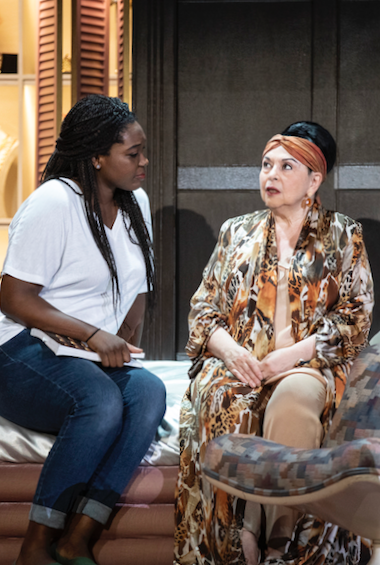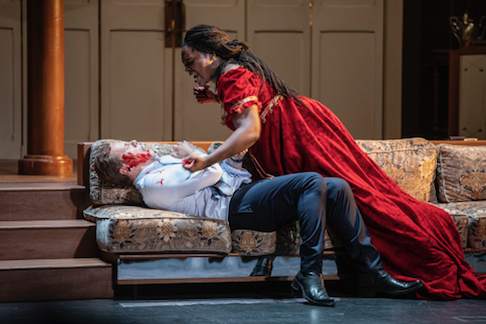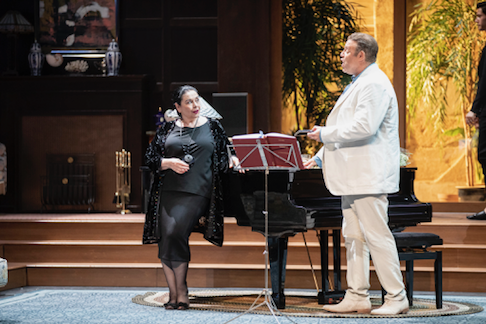
09 Jul 2019
Tosca in Aix
From the sublime — the Mozart Requiem — to the ridiculous, namely stage director Christophe Honoré's Tosca. A ridiculous waste of operatic resources.
English Touring Opera are delighted to announce a season of lyric monodramas to tour nationally from October to December. The season features music for solo singer and piano by Argento, Britten, Tippett and Shostakovich with a bold and inventive approach to making opera during social distancing.
This tenth of ten Live from London concerts was in fact a recorded live performance from California. It was no less enjoyable for that, and it was also uplifting to learn that this wasn’t in fact the ‘last’ LfL event that we will be able to enjoy, courtesy of VOCES8 and their fellow vocal ensembles (more below …).
Ever since Wigmore Hall announced their superb series of autumn concerts, all streamed live and available free of charge, I’d been looking forward to this song recital by Ian Bostridge and Imogen Cooper.
The Sixteen continues its exploration of Henry Purcell’s Welcome Songs for Charles II. As with Robert King’s pioneering Purcell series begun over thirty years ago for Hyperion, Harry Christophers is recording two Welcome Songs per disc.
Although Stile Antico’s programme article for their Live from London recital introduced their selection from the many treasures of the English Renaissance in the context of the theological debates and upheavals of the Tudor and Elizabethan years, their performance was more evocative of private chamber music than of public liturgy.
In February this year, Albanian soprano Ermonela Jaho made a highly lauded debut recital at Wigmore Hall - a concert which both celebrated Opera Rara’s 50th anniversary and honoured the career of the Italian soprano Rosina Storchio (1872-1945), the star of verismo who created the title roles in Leoncavallo’s La bohème and Zazà, Mascagni’s Lodoletta and Puccini’s Madama Butterfly.
Evidently, face masks don’t stifle appreciative “Bravo!”s. And, reducing audience numbers doesn’t lower the volume of such acclamations. For, the audience at Wigmore Hall gave soprano Elizabeth Llewellyn and pianist Simon Lepper a greatly deserved warm reception and hearty response following this lunchtime recital of late-Romantic song.
Collapsology. Or, perhaps we should use the French word ‘Collapsologie’ because this is a transdisciplinary idea pretty much advocated by a series of French theorists - and apparently, mostly French theorists. It in essence focuses on the imminent collapse of modern society and all its layers - a series of escalating crises on a global scale: environmental, economic, geopolitical, governmental; the list is extensive.
For this week’s Live from London vocal recital we moved from the home of VOCES8, St Anne and St Agnes in the City of London, to Kings Place, where The Sixteen - who have been associate artists at the venue for some time - presented a programme of music and words bound together by the theme of ‘reflection’.
'Such is your divine Disposation that both you excellently understand, and royally entertaine the Exercise of Musicke.’
Amongst an avalanche of new Mahler recordings appearing at the moment (Das Lied von der Erde seems to be the most favoured, with three) this 1991 Mahler Second from the 2nd Kassel MahlerFest is one of the more interesting releases.
‘And there was war in heaven: Michael and his angels fought against the dragon; and the dragon fought and his angels, And prevailed not; neither was their place found any more in heaven … that old serpent … Satan, which deceiveth the whole world: he was cast out into the earth, and his angels were cast out with him.’
If there is one myth, it seems believed by some people today, that probably needs shattering it is that post-war recordings or performances of Wagner operas were always of exceptional quality. This 1949 Hamburg Tristan und Isolde is one of those recordings - though quite who is to blame for its many problems takes quite some unearthing.
There was never any doubt that the fifth of the twelve Met Stars Live in Concert broadcasts was going to be a palpably intense and vivid event, as well as a musically stunning and theatrically enervating experience.
‘Love’ was the theme for this Live from London performance by Apollo5. Given the complexity and diversity of that human emotion, and Apollo5’s reputation for versatility and diverse repertoire, ranging from Renaissance choral music to jazz, from contemporary classical works to popular song, it was no surprise that their programme spanned 500 years and several musical styles.
The Academy of St Martin in the Fields have titled their autumn series of eight concerts - which are taking place at 5pm and 7.30pm on two Saturdays each month at their home venue in Trafalgar Square, and being filmed for streaming the following Thursday - ‘re:connect’.
The London Symphony Orchestra opened their Autumn 2020 season with a homage to Oliver Knussen, who died at the age of 66 in July 2018. The programme traced a national musical lineage through the twentieth century, from Britten to Knussen, on to Mark-Anthony Turnage, and entwining the LSO and Rattle too.
With the Live from London digital vocal festival entering the second half of the series, the festival’s host, VOCES8, returned to their home at St Annes and St Agnes in the City of London to present a sequence of ‘Choral Dances’ - vocal music inspired by dance, embracing diverse genres from the Renaissance madrigal to swing jazz.
Just a few unison string wriggles from the opening of Mozart’s overture to Le nozze di Figaro are enough to make any opera-lover perch on the edge of their seat, in excited anticipation of the drama in music to come, so there could be no other curtain-raiser for this Gala Concert at the Royal Opera House, the latest instalment from ‘their House’ to ‘our houses’.
"Before the ending of the day, creator of all things, we pray that, with your accustomed mercy, you may watch over us."

From the sublime — the Mozart Requiem — to the ridiculous, namely stage director Christophe Honoré's Tosca. A ridiculous waste of operatic resources.
Christophe Honoré is a high-profile French film maker and playwright who is a prominent gay activist in this time of a long overdue updating of human rights. This places Mr. Honoré in prime position to become a part of France’s progressive opera world, namely the Aix Festival where he directed the 2016 Ethiopian Cosi fan tutte and the Opéra de Lyon where he directed the 2017 Don Carlos wrapped in stage curtains (until the auto da fé which was stuffed into the galleries of an Elizabethan theater).
Thus it is no surprise that he should be back on the front lines of French avant-garde opera, again at the Aix Festival with a Tosca than he has set in New York City’s Manhattan, or maybe in the far less sophisticated Bronx. It is not Tosca the opera, it is an unsettling tale of the demise of a Tosca diva, Puccini’s magnificent score reduced to a troubling piece of prosaic theater.
Mr. Honoré states in the program booklet that the big question in Tosca is if an artist’s art can protect the artist from life — Tosca’s does not, Cavaradossi’s does not. It would seem that the question need not be asked, since the great, even gigantic gesture in Puccini’s Tosca is release from life. The opera Tosca is an artistic ritual of liberation that can be infinitely repeated. It is not an “impermanent” (descriptive term used by director Honoré) work of art waiting to be used.
 Angel Blue as Tosca in the copy of the dress worn by the Tosca of Maria Callas, Alexey Markov as Scarpia.
Angel Blue as Tosca in the copy of the dress worn by the Tosca of Maria Callas, Alexey Markov as Scarpia.
And abused. Abused by the giant screen film adaptations (movies) of real performances that occurred in the past few weeks in Aix cinemas. Or abused by re-writing the story to make the first act the rehearsal for a concert to honor an aged diva, the second act to illustrate psycho-sexual implications of gay diva worship, and the third act to be the concert where the diva is the victim of her art, taking her own life at the conclusion of the concert.
A reading of The Rise and Fall of Gay Culture might suggest that the gay men of the second act vicariously execute the diva to rid themselves of their arch competitor for the seduction of desired males (Cavaradossi, for example).
Then there was the abuse of the audience, making us wait while the orchestra was moved to the stage (no easy process), thus repeating the wait-abuse Mr. Honoré perpetrated on the Lyon Don Carlos audience. And the abuse of the audience by two videographers stalking the stage to capture faces to be continuously projected on giant screens above the stage floor, images of disembodied voices that Mr. Honoré ordains as images of the real (as opposed to the operatic).
The revelation of the evening was the very present, vibrant sound of the Archeveché theater pit evidenced by the huge presence of the excellent orchestra of the Opéra de Lyon. Conductor Daniele Rustioni, music director of the Opéra de Lyon, offered an idiomatically correct reading of the Puccini score, allowing its subtleties to shine forth. The orchestral sound was forceful indeed, though it never competed with the stage for presence. Once on-stage the orchestral sound was nearly magnificent, an unexpected acoustic miracle.
The aged diva of the Christophe Honoré’s Tosca was Catherine Malfitano, once an internationally recognized Tosca. La Malfitano is now seventy-one years old, and retains the remarkable presence that marked her long and distinguished career. She bravely fought her way through this ordeal of uselessness, bravely enduring the ravages of time on the body and voice in this savage vision of artistic demise.
The ingenue Tosca diva was American soprano Angel Blue, already a Mimi on major stages she may yet become a new age Tosca. Maltese tenor Joseph Calleja sang Cavaradossi, his rôle fétishe. His recent Cavaradossi at the Met boasted secure high notes that did not find their way to Aix, the intimacy of the Archeveché theater did not favor his blatant, high-horsepower delivery.
 Catherine Malfitano as the Diva, Joseph Calleja as Cavaradossi
Catherine Malfitano as the Diva, Joseph Calleja as Cavaradossi
Russian bass baritone Alexey Markov provided a trim figured, vocally dark and focused Scarpia. The cluttered, frenetic happenings (lots of gay sex stage-right) on the stage eclipsed his great moments. It was unclear how he fit into the picture. Tosca brutally stabbed him in the face, meanwhile the aged Tosca diva payed a Cavaradossi double for sex. There was so much extra-opera stuff going on I wasn’t sure where to look to discover the essentials. If there were any.
Michael Milenski
Cast and production information:
La Prima Donna: Catherine Malfitano; Floria Tosca: Angel Blue; Mario Cavaradossi: Joseph Calleja; Il barone Scarpia: Alexey Markov: Cesare Angelotti: Simon Shibambu; Il sagrestano: Leonardo Galeazzi; Sciarrone: Jean-Gabriel Saint Martin; Spoletta: Michael Smallwood; Un Carceriere: Virgile Ancely; Le Majordome: Jean-Frédéric Lemoues; Pompier: Frank Daumas. Orchestre et Choeur de l’Opéra de Lyon; Maîtrise de l’Opéra de Lyon. Conductor: Daniele Rustioni; Mise en scène: Christophe Honoré; Scénographie: Alban Ho Van; Costumes: Olivier Bériot; Lumière: Dominique Bruguière. Théâtre de l’Archeveché, Aix-en-Provence, France, July 6, 2019.